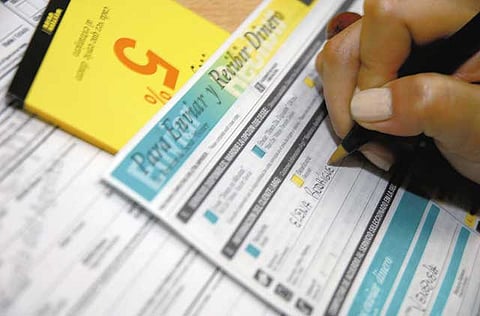Quick and effective ways to remit money
There are various methods to transfer funds, however consumers must always read the fine print

In an attempt to meet the huge demand for remittance services in Dubai, several companies now offer a plethora of ways for customers to send money back home.
Wire transfer services are a popular way to transfer funds electronically from one bank account to either another bank account or a cash office. In order to complete the wire transfer, details of the recipient's bank or wire transfer code and location code for the cash office are required.
Service providers
Other companies thatoffer wire transfers include Western Union. Likeother remittance services, there are charge fees based on how quickly funds need to be transferred. For example, Western Union's ‘Money in Minutes' service is more expensive than the ‘Next Day' transfer option.
Bank drafts are commonly used for payments to companies in foreign countries. While it's more expensive than other methods, it's still preferred by companies due to its added security and audit trail features.
Due to better connectivity and improved online security, internet money transfer services are quickly gaining popularity. Funds can be transferred through third parties or banks to anyone with an email account. Third party companies typically charge a transaction fee for every transfer of funds to the recipient's bank account. In addition, there's a processing delay of a few days to receive the funds.
Money orders are provided by specialised firms such as MoneyGram and Western Union. In addition to a transfer fee, senders pay these firms the amount that needs to be transferred. The sender is then provides the recipient with a password required to collect the funds from a cash office. Money orders are often used to transfer funds to remote or rural areas where banks may not be easily accessible or places where people may not have bank accounts. It's also cheaper than wire transfers.
Fees and rates
Residents of Dubai may remit money through banks, exchange houses, or specialised firms. Typically, exchange houses are preferred as they're reliable and offer favourable interest rates.
Exchange houses such as UAE Exchange, Al Ansari and Al Fardan Exchange offer remittance services at competitive rates by leverage comprehensive global networks and through link-ups with various banks and firms such as Western Union. Services include demand drafts, electronic transfers, telegraphic transfers and various packages in tandem with companies such as MasterCard and Coinstar Money Transfer.
Higher fees
Banks often charge higher transaction fees and less favourable exchange rates, in addition to hidden charges. However, lately banks have made attempts to capture market share by offering competitive products.
For example, HSBC offers free remittances to HSBC accounts in Bangladesh, with funds that can be transferred within three to five working days. Citibank has also launched a current account that allows account holders to transfer money through multiple access channels via phone, ATM, internet or bank branches to Pakistan. They also offer special foreign exchange rates.
However, while some of these schemes may appear to be bargains, it's always advisable for customers to carefully read the fine print; banks are notorious for charging high exchange rates and often include additional hidden charges.
Within a short period, competition and demand for services has led to a rapid evolution of the remittance industry. In addition to ATMs, phone and online services, recipients can have the money transferred as cash to be picked up at a designated location or simply credited to their bank account or card.For added convenience, recipients can now receive the money in their accounts, agent locations, and even their homes.


